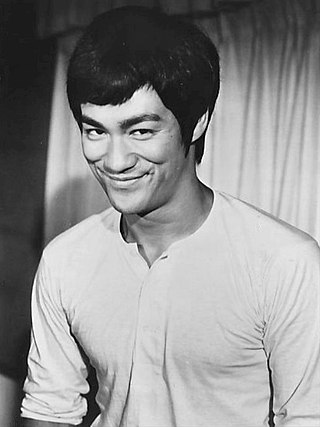
Bruce Lee was a Hong Kong-American martial artist and actor whose career spanned Hong Kong and the United States. He was the founder of Jeet Kune Do, a hybrid martial arts philosophy drawing from different combat disciplines that is sometimes credited with paving the way for modern mixed martial arts (MMA). Lee is considered by some commentators and martial artists to be the most influential martial artist of all time and a pop culture icon of the 20th century, who bridged the gap between East and West. He is credited with promoting Hong Kong action cinema and helping to change the way Chinese people were presented in American films.
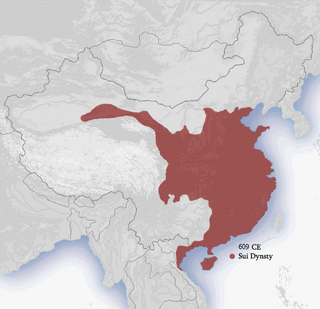
The Sui dynasty was a short-lived Chinese imperial dynasty that ruled from 581 to 618. The re-unification of China proper under the Sui brought the Northern and Southern dynasties era to a close, ending a prolonged period of political division since the War of the Eight Princes. The Sui endeavoured to rebuild the country, re-establishing and reforming many imperial institutions; in so doing, the Sui laid much of the foundation for the subsequent Tang dynasty, who after toppling the Sui would ultimately preside over a new golden age in Chinese history.
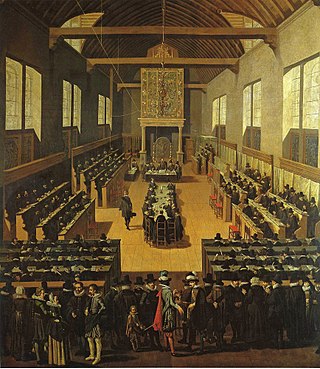
The Synod of Dort was an international Synod held in Dordrecht in 1618–1619, by the Dutch Reformed Church, to settle a divisive controversy caused by the rise of Arminianism. The first meeting was on 13 November 1618 and the final meeting, the 180th, was on 29 May 1619. Voting representatives from eight foreign Reformed churches were also invited. Dort was a contemporary Dutch term for the town of Dordrecht.

Yue Fei, courtesy name Pengju (鵬舉) was a Chinese military general who lived during the Southern Song dynasty and remembered a national hero of Song China by people, known for leading its forces in the wars in the 12th century between Southern Song and the Jurchen-ruled Jin dynasty in northern China. Because of his warlike stance, he was put to death by the Southern Song government in 1142 under a frameup, after a negotiated peace was achieved with the Jurchens. Yue Fei is depicted in the Wu Shuang Pu by Jin Guliang.
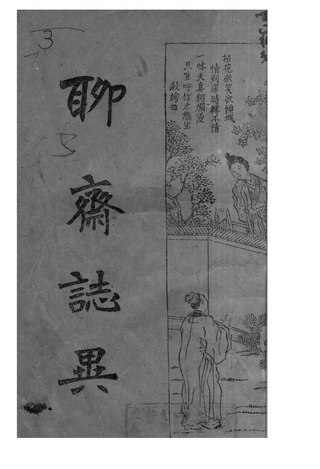
Liaozhai zhiyi, sometimes shortened to Liaozhai, known in English as Strange Tales from a Chinese Studio, Strange Stories from a Chinese Studio, Strange Tales from Make-Do Studio, or literally Strange Tales from a Studio of Leisure, is a collection of Classical Chinese stories by Qing dynasty writer Pu Songling, comprising close to 500 stories or "marvel tales" in the zhiguai and chuanqi styles, which according to some critics, served to implicitly criticise societal problems. Written over a period of forty years from the late 1600s and ending in the early 1700s, it circulated in manuscripts that were copied and recopied among the author's friends but did not appear in print until 1766. Since then, many of the critically lauded stories have been adapted for other media such as film and television.
The Seven Grievances was a manifesto announced by Nurhaci, khan of the Later Jin, on the thirteenth day of the fourth lunar month in the third year of the Tianming era of his reign; 7 May 1618. It effectively declared war against the Ming dynasty.

Cai Jing (1047–1126), courtesy name Yuanchang (元長), was a Chinese calligrapher and politician who lived during the Northern Song dynasty of China. He is also fictionalised as one of the primary antagonists in Water Margin, one of the Four Great Classical Novels of Chinese literature.
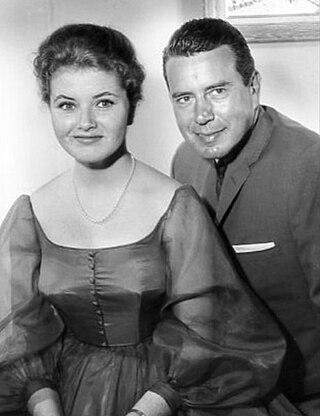
Bachelor Father is an American sitcom starring John Forsythe, Noreen Corcoran and Sammee Tong. The series first premiered on CBS in September 1957 before moving to NBC for the third season in 1959. The series' fifth and final season aired on ABC. A total of 157 episodes were aired. The series was based on "A New Girl in His Life", which aired on General Electric Theater on May 26, 1957.

The Lê dynasty, also known in historiography as the Later Lê dynasty, officially Great Việt, was the longest-ruling Vietnamese dynasty, having ruled from 1428 to 1789, with an interregnum between 1527 and 1533. The Lê dynasty is divided into two historical periods: the Initial Lê dynasty before the usurpation by the Mạc dynasty, in which emperors ruled in their own right, and the Revival Lê dynasty, in which emperors were figures reigned under the auspices of the powerful Trịnh family. The Revival Lê dynasty was marked by two lengthy civil wars: the Lê–Mạc War (1533–1592) in which two dynasties battled for legitimacy in northern Vietnam and the Trịnh–Nguyễn Wars between the Trịnh lords in North and the Nguyễn lords of the South.

Lê Thánh Tông, personal name Lê Hạo, temple name Thánh Tông, courtesy name Tư Thành, was an emperor of Đại Việt, reigning from 1460 to 1497, the fifth and the longest-reigning emperor of the Later Lê dynasty, and is widely praised as one of the greatest emperors in Vietnamese history. He came to power through a coup d'état against his second brother Lê Nghi Dân in 1460.

Bao Tong was a Chinese writer and activist. He was Director of the Office of Political Reform of the Central Committee of the Chinese Communist Party (CCP) and the Policy Secretary of Zhao Ziyang. He was also Director of the Drafting Committee for the CCP 13th Party Congresses, known for its strong support of market reform and opening up under Deng Xiaoping. Prior to this, he was a committee member and then deputy director of the Chinese State Commission for Economic Reform. During the 1989 Tian’anmen square protests, he was one of the very few Chinese senior officials to express understandings with the demonstrating students, which led to his arrest shortly before the June Fourth incident.

Zhou Tong was the archery teacher and second military arts tutor of famous Song dynasty general Yue Fei. Originally a local hero from Henan, he was hired to continue Yue Fei's military training in archery after the boy had rapidly mastered spearplay under his first teacher. In addition to the future general, Zhou accepted other children as archery pupils. During his tutelage, Zhou taught the children all of his skills and even rewarded Yue with his two favorite bows because he was his best pupil. After Zhou's death, Yue would regularly visit his tomb twice a month and perform unorthodox sacrifices that far surpassed that done for even beloved tutors. Yue later taught what he had learned from Zhou to his soldiers and they were successful in battle.

Tang, is a Chinese surname. The three languages also have the surname with the same character but different pronunciation/romanization. In Korean, it is usually romanized also as Dang. In Japanese, the surname is often romanized as To. In Vietnamese, it is commonly written as Đường. It is pronounced dhɑng in Middle Chinese, and lhāŋ in Old Chinese. It is the 64th name on the Hundred Family Surnames poem.

The Đại Việt sử ký toàn thư is the official national chronicle of the Đại Việt, that was originally compiled by the royal historian Ngô Sĩ Liên under the order of the Emperor Lê Thánh Tông and was finished in 1479 during the Lê period. The 15-volume book covered the period from Hồng Bàng dynasty to the coronation of Lê Thái Tổ, the first emperor of the Lê dynasty in 1428. In compiling his work, Ngô Sĩ Liên based on two principal historical sources which were Đại Việt sử ký by Lê Văn Hưu and Đại Việt sử ký tục biên by Phan Phu Tiên. After its publication, Đại Việt sử ký toàn thư was continually supplemented by other historians of the royal court such as Vũ Quỳnh and Phạm Công Trứ. Today the most popular version of Đại Việt sử ký toàn thư is the Nội các quan bản edition which was completed in 1697 with the additional information up to 1656 during the reign of the Emperor Lê Thần Tông and the Lord Trịnh Tráng. Đại Việt sử ký toàn thư is considered the most important and comprehensive historical book. The chronicle, which was modeled after Sima Qian’s Records of the Grand Historian, provides a chronological history beginning with the legendary Hồng Bàng dynasty and continuing to the founding of the house of Lê in 1428.
De-Sinicization is a process of eliminating or reducing Han Chinese cultural elements, identity, or consciousness from a society or nation. In modern contexts, it is often contrasted with the assimilation process of Sinicization.
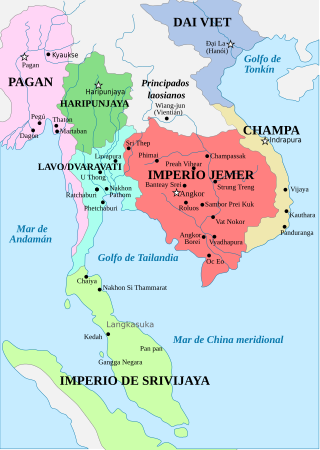
Đại Việt, often known as Annam, was a monarchy in eastern Mainland Southeast Asia from the 10th century AD to the early 19th century, centered around the region of present-day Hanoi, Northern Vietnam. Its early name, Đại Cồ Việt, was established in 968 by Vietnamese ruler Đinh Bộ Lĩnh after he ended the Anarchy of the 12 Warlords, until the beginning of the reign of Lý Thánh Tông, the third emperor of the Lý dynasty. Đại Việt lasted until the reign of Gia Long, the first emperor of the Nguyễn dynasty, when the name was changed to Việt Nam.

Nurhaci, also known by his temple name as the Emperor Taizu of Qing, was the founding khan of the Jurchen Later Jin dynasty of China from 1616 to 1626.

The Jurchen unification were a series of events in the late 16th and early 17th centuries that led to the unification of the Jurchen tribes under the Jianzhou Jurchen leader Nurhaci. While Nurhaci was originally a vassal of the Ming dynasty who considered himself a local representative of imperial Ming power, he also had a somewhat antagonistic relationship with the Ming due to Ming's involvement in events early on in his life that led to the death of his father and grandfather combined with his own increasing ambition. From 1583 to the early 1600s, Nurhaci led a series of military and influence campaigns that led to the unification of the majority of the Jurchen tribes. In 1616, Nurhaci established the Later Jin dynasty and ruled as its founding khan, and he renounced Ming overlordship with the Seven Grievances in 1618. After his death in 1626 his son Hong Taiji proclaimed the Qing dynasty by renaming the dynasty "Great Qing".

Wang Tong, style name Zhongyan (仲淹), posthumous name Master Wenzhong (文中子) was a was a Chinese philosopher and politician during the Sui dynasty.

Champa–Dai Viet War of 982 or Cham–Vietnamese War of 982 was a military expedition launched by Vietnamese King Lê Hoàn of Đại Việt against King Jaya Paramesvaravarman I of Champa in 982. It resulted in the defeat of the Cham forces and the death of Paramesvaravarman I in battle. This marked the beginning of a southward Vietnamese advance against Champa.


















